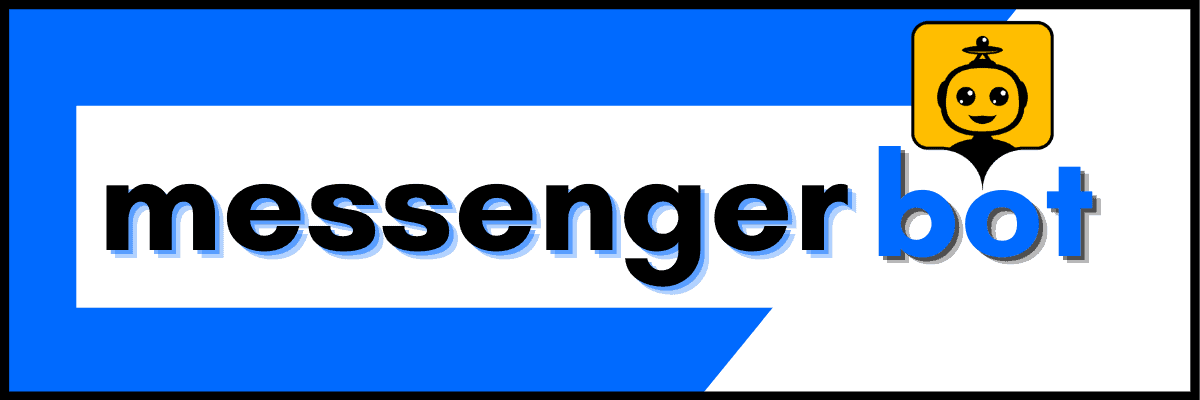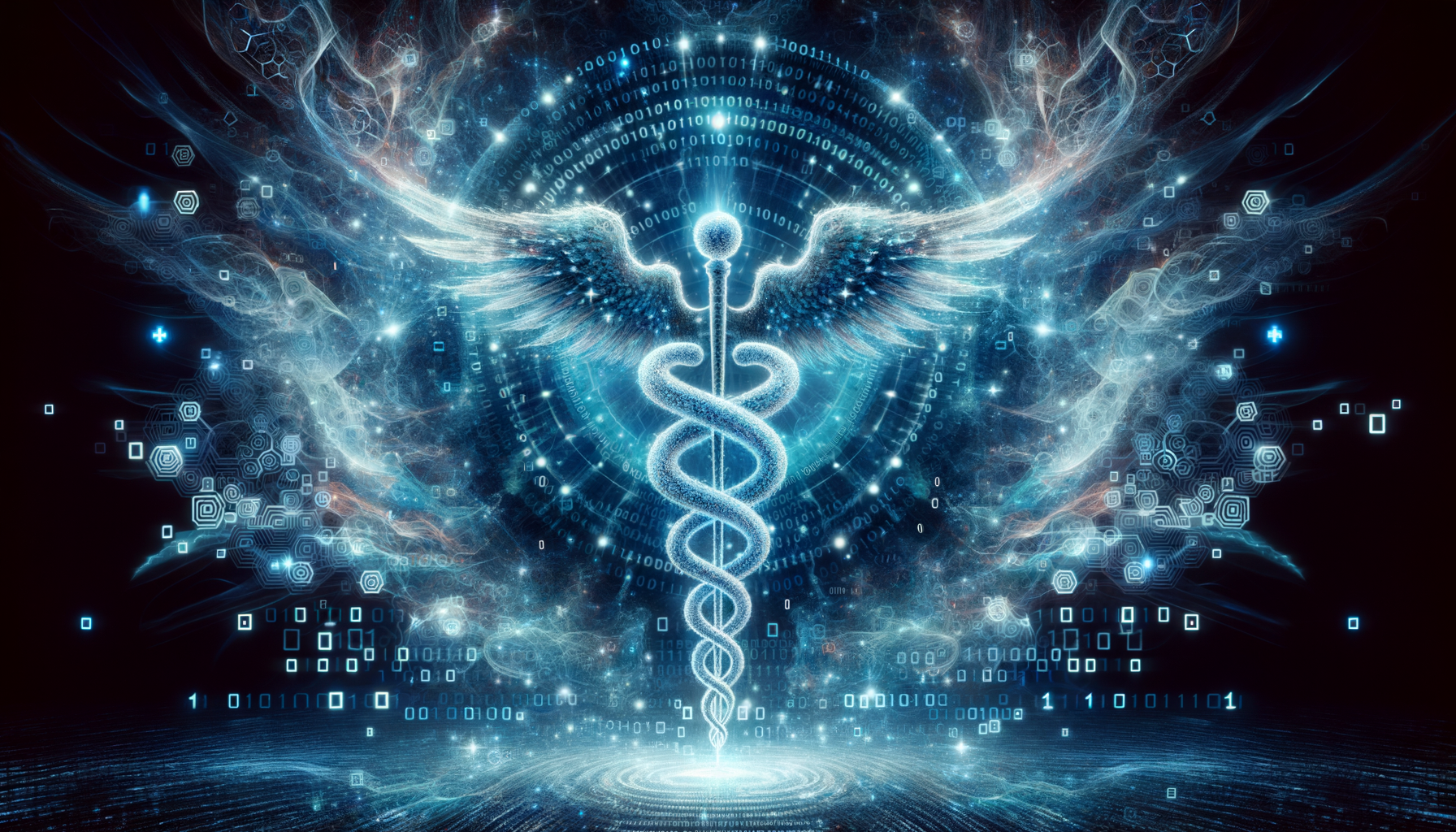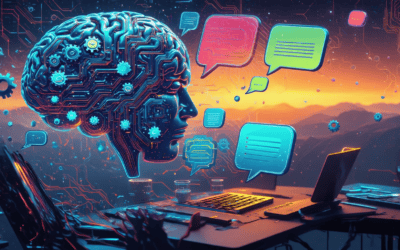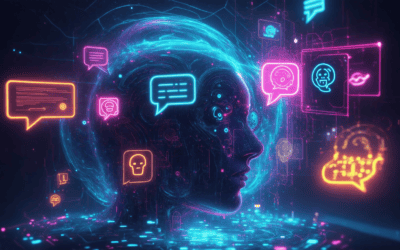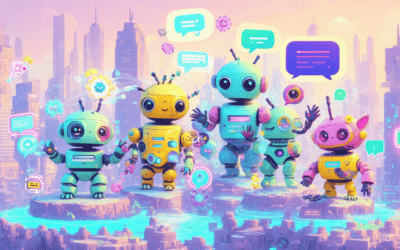In the rapidly evolving landscape of healthcare, chatbot technology is emerging as a game-changing force, revolutionizing patient care and streamlining medical processes. From AI-powered healthcare chatbots to sophisticated clinical chatbots, these digital assistants are transforming the way patients interact with healthcare providers and access vital information. As we delve into the world of chatbot technologies in healthcare, we’ll explore the four types of chatbots, examine real-world chatbot technology examples, and uncover how these intelligent systems are reshaping the healthcare industry. Whether you’re curious about the mechanics behind chatbots, their practical applications in medical settings, or the impact of advanced AI like ChatGPT on healthcare, this article will provide a comprehensive overview of how chatbot technology is ushering in a new era of patient-centered care and hospital efficiency.
Understanding Chatbot Technology in Healthcare
In the rapidly evolving landscape of healthcare, chatbot technology has emerged as a powerful tool for enhancing patient care and streamlining medical processes. As a leading provider of AI-powered chatbot solutions, we’ve witnessed firsthand the transformative impact of these digital assistants in the healthcare industry. Let’s delve into the world of chatbots and explore their applications in medical settings.
What are the four types of chatbots?
Understanding the different types of chatbots is crucial for healthcare providers looking to implement this technology effectively. Here are the four main categories of chatbots:
- Rule-Based Chatbots: These follow predefined rules and decision trees to provide responses. They’re best for simple, straightforward interactions like FAQs or basic customer service queries in healthcare settings.
- AI-Powered Chatbots: Utilizing machine learning and natural language processing, these chatbots understand context and intent, offering more human-like conversations. They improve over time through continuous learning, making them ideal for complex patient interactions.
- Hybrid Chatbots: Combining rule-based and AI capabilities, hybrid chatbots offer the reliability of pre-programmed responses with the flexibility of AI-driven understanding for complex queries. This makes them versatile tools in healthcare, capable of handling both routine and nuanced patient inquiries.
- Conversational AI Chatbots: These advanced chatbots use sophisticated natural language understanding (NLU) and generation (NLG) to engage in more nuanced, context-aware dialogues, often indistinguishable from human interactions. In healthcare, they can provide personalized patient support and assist with complex medical information retrieval.
Each type of chatbot serves specific purposes in healthcare, from basic task automation to complex problem-solving, catering to diverse needs in patient care, medical information dissemination, and administrative support.
Exploring chatbot technology examples in medical settings
The integration of chatbot technology in healthcare has led to innovative applications that enhance patient care and streamline medical processes. Here are some compelling examples:
- Symptom Checkers: AI-powered chatbots can engage patients in conversations about their symptoms, providing preliminary assessments and guiding them towards appropriate care. For instance, Babylon Health offers an AI-driven symptom checker that helps patients understand their conditions and decide on the next steps.
- Appointment Scheduling: Chatbots simplify the process of booking medical appointments. They can access calendars, suggest available slots, and confirm bookings, reducing the workload on administrative staff.
- Medication Reminders: Chatbots can send personalized reminders to patients about their medication schedules, improving adherence to treatment plans. Our easy-to-set-up chatbots can be programmed to deliver these reminders across various platforms.
- Mental Health Support: Platforms like Woebot use conversational AI to provide cognitive behavioral therapy techniques, offering 24/7 support for individuals dealing with anxiety and depression.
- Post-Treatment Follow-ups: Chatbots can conduct automated follow-ups with patients after treatments or surgeries, collecting data on recovery progress and alerting healthcare providers to any concerning symptoms.
These examples demonstrate the versatility of chatbot technology in healthcare. By leveraging AI-powered customer service bots, healthcare providers can elevate their support experience, offering patients more accessible, efficient, and personalized care.

The Mechanics Behind Healthcare Chatbots
As we delve deeper into the world of chatbot technology in healthcare, it’s crucial to understand how these digital assistants actually function. Our AI-powered chatbot solutions leverage cutting-edge technology to provide seamless interactions in medical settings.
How do chatbots actually work?
Chatbots operate through a sophisticated blend of natural language processing (NLP), machine learning, and artificial intelligence algorithms. When a patient or healthcare professional inputs a message, the chatbot’s NLP system analyzes it to interpret intent and extract key information. The chatbot then searches its knowledge base, which can include pre-programmed responses, dynamic data sources, or AI-generated content, to formulate a relevant answer.
The response generation process varies depending on the type of chatbot:
- Rule-based systems: Follow predefined paths based on specific keywords or phrases, ideal for straightforward healthcare queries.
- Retrieval-based models: Select the most appropriate response from a database of pre-written answers, useful for providing consistent information about medical procedures or policies.
- Generative models: Create unique responses using natural language generation techniques, allowing for more personalized patient interactions.
Advanced healthcare chatbots, like those offered by Messenger Bot, utilize machine learning to continuously improve their responses based on user interactions and feedback. This adaptive capability is crucial in the ever-evolving field of medicine.
These chatbots can integrate with external systems, APIs, and databases to access real-time information, such as patient records or drug interaction data. They may also employ sentiment analysis to gauge patient emotions and adjust responses accordingly, providing a more empathetic interaction.
Chatbot technology stock: Investing in healthcare AI
The growing adoption of chatbot technology in healthcare has created exciting investment opportunities. As investors seek to capitalize on this trend, several companies are emerging as leaders in the healthcare AI space:
- Microsoft (MSFT): With its Azure Healthcare Bot service, Microsoft offers a comprehensive platform for developing healthcare-specific chatbots.
- IBM (IBM): IBM’s Watson Health division provides AI solutions, including chatbots, for various healthcare applications.
- Nuance Communications (NUAN): Recently acquired by Microsoft, Nuance specializes in conversational AI for healthcare.
- Verint Systems (VRNT): Offers AI-powered chatbot solutions that can be tailored for healthcare use cases.
While these larger tech companies offer stability, investors should also consider innovative startups in the healthcare AI space. Companies like Babylon Health and Woebot are pushing the boundaries of what’s possible with chatbot technology in mental health and general medical care.
At Messenger Bot, we’re at the forefront of this technological revolution, offering cutting-edge AI-powered customer service bots that can be customized for healthcare applications. Our platform allows healthcare providers to implement sophisticated chatbot solutions without the need for extensive technical expertise.
As the healthcare industry continues to embrace AI and chatbot technology, we anticipate significant growth in this sector. Investors looking to capitalize on this trend should consider a diversified approach, balancing established tech giants with promising healthcare AI startups.
Practical Applications of Chatbots in Patient Care
At Messenger Bot, we’re revolutionizing healthcare with our AI-powered chatbot solutions. Our technology is transforming patient care, offering innovative ways to enhance communication, streamline processes, and improve overall healthcare experiences.
What is a chatbot with an example?
A chatbot is an AI-powered software application designed to simulate human-like conversations through text or voice interactions. In healthcare, chatbots serve as virtual assistants, providing patients with immediate support and information.
For example, our AI-powered customer service bots can be customized for healthcare applications, such as appointment scheduling or symptom checking. A patient might interact with our chatbot like this:
Patient: “I need to schedule a check-up appointment.”
Chatbot: “Certainly! I can help you schedule a check-up. What’s your preferred date and time?”
Patient: “Next Tuesday afternoon, if possible.”
Chatbot: “Great! I have an available slot on Tuesday at 2:00 PM. Would that work for you?”
Patient: “Yes, that’s perfect.”
Chatbot: “Excellent! I’ve scheduled your check-up for next Tuesday at 2:00 PM. Is there anything else I can help you with?”
This example demonstrates how our chatbots can efficiently handle routine tasks, freeing up healthcare staff to focus on more complex patient needs.
What are chatbots used for in healthcare?
Chatbots have numerous applications in healthcare, revolutionizing patient care and streamlining administrative processes. Here are some key uses:
- Appointment Scheduling: Our chatbots can handle appointment bookings, reminders, and rescheduling, reducing no-shows and improving clinic efficiency.
- Symptom Checking: By asking a series of questions, chatbots can provide initial assessments and guide patients to appropriate care levels.
- Medication Management: Chatbots can send reminders for medication intake and provide information about potential side effects or drug interactions.
- Mental Health Support: AI-powered chatbots, like those offered by Woebot, provide 24/7 support for mental health concerns, offering coping strategies and resources.
- Health Information Dissemination: Chatbots can provide reliable health information, answering common questions about conditions, treatments, and preventive care.
- Post-Treatment Follow-ups: Our chatbots can conduct post-discharge check-ins, monitoring patient recovery and flagging any concerns for healthcare providers.
- Insurance and Billing Inquiries: Chatbots can handle routine questions about insurance coverage and billing, improving patient satisfaction and reducing administrative workload.
At Messenger Bot, we’re constantly innovating to expand the capabilities of our chatbots in healthcare. Our AI chatbot for healthcare is designed to integrate seamlessly with existing healthcare systems, ensuring a smooth transition to more efficient, patient-centric care.
As the healthcare industry continues to embrace chatbot technology, we’re seeing remarkable improvements in patient engagement, care accessibility, and operational efficiency. Platforms like Babylon Health are pioneering the use of AI in telemedicine, while we at Messenger Bot are focusing on creating versatile chatbot solutions that can be tailored to various healthcare scenarios.
By leveraging our easy-to-setup AI chat bot, healthcare providers can quickly implement sophisticated conversational AI solutions, enhancing their ability to provide timely, personalized care to patients. As we continue to advance our chatbot technologies, we’re excited about the potential to further transform patient care and contribute to more efficient, accessible healthcare systems worldwide.
Comparing Healthcare Chatbots to Virtual Assistants
At Messenger Bot, we’re constantly innovating to stay at the forefront of chatbot technology in healthcare. While our AI-powered chatbot solutions are specifically designed for healthcare applications, it’s important to understand how they compare to popular virtual assistants like Alexa and Siri.
Is Alexa a chatbot?
Alexa is not a traditional chatbot, but a sophisticated AI-powered virtual assistant developed by Amazon. While our chatbots typically operate via text-based interactions, Alexa primarily uses voice recognition and natural language processing to communicate. Alexa’s capabilities extend far beyond simple conversational exchanges, encompassing smart home control, task automation, and information retrieval.
Recent advancements in Alexa’s AI have significantly enhanced its conversational abilities, allowing for more natural, context-aware interactions. This improvement enables Alexa to engage in back-and-forth dialogues on diverse topics, mimicking human-like conversations. However, Alexa’s core functionality as a virtual assistant distinguishes it from conventional chatbots like ours.
Alexa utilizes deep learning algorithms and cloud-based processing to continuously improve its understanding and responses. This technology allows Alexa to perform complex tasks, integrate with various devices and services, and provide personalized experiences based on user preferences and behavior patterns.
While Alexa’s conversational capabilities may resemble those of advanced chatbots, its comprehensive feature set, voice-first interface, and integration with the Internet of Things (IoT) ecosystem position it as a more evolved and versatile AI assistant.
In contrast, our healthcare-focused chatbots are specifically designed to handle medical inquiries, appointment scheduling, and patient support through text-based interactions. This specialization allows us to provide more targeted and efficient assistance in healthcare settings.
Is Siri a type of chatbot?
Similar to Alexa, Siri is not a traditional chatbot but an AI-powered virtual assistant developed by Apple. While our chatbots are designed for specific healthcare applications, Siri is a general-purpose assistant integrated into Apple devices.
Key differences between Siri and healthcare chatbots like ours include:
- Interaction Method: Siri primarily uses voice commands, while our chatbots typically engage through text-based conversations.
- Specialization: Our AI-powered customer service bots are tailored for healthcare, whereas Siri offers general assistance across various domains.
- Integration: Siri is deeply integrated with Apple’s ecosystem, while our chatbots can be seamlessly incorporated into various healthcare platforms and websites.
- Customization: Our chatbots can be customized to meet specific healthcare provider needs, while Siri’s functionality is more standardized across users.
While Siri has made significant strides in natural language processing and can handle a wide range of queries, it’s not specifically designed for healthcare applications. Our chatbots, on the other hand, are built with the nuances of medical communication in mind, ensuring accurate and helpful responses to health-related inquiries.
For instance, our chatbots can be programmed with extensive medical knowledge bases, allowing them to provide more detailed and accurate health information. They can also integrate with electronic health records and appointment systems, offering a more seamless experience for patients and healthcare providers alike.
At Messenger Bot, we’re committed to pushing the boundaries of what’s possible with AI chat bots in healthcare. While virtual assistants like Alexa and Siri have their place in general consumer use, our specialized chatbots are transforming the way patients interact with healthcare systems, improving accessibility, efficiency, and overall patient care.
As we continue to refine our chatbot technology, we’re excited about the potential to further bridge the gap between AI assistance and human-like interactions in healthcare settings. Our goal is to create chatbots that not only provide accurate information and efficient service but also offer a compassionate and personalized experience for every patient.
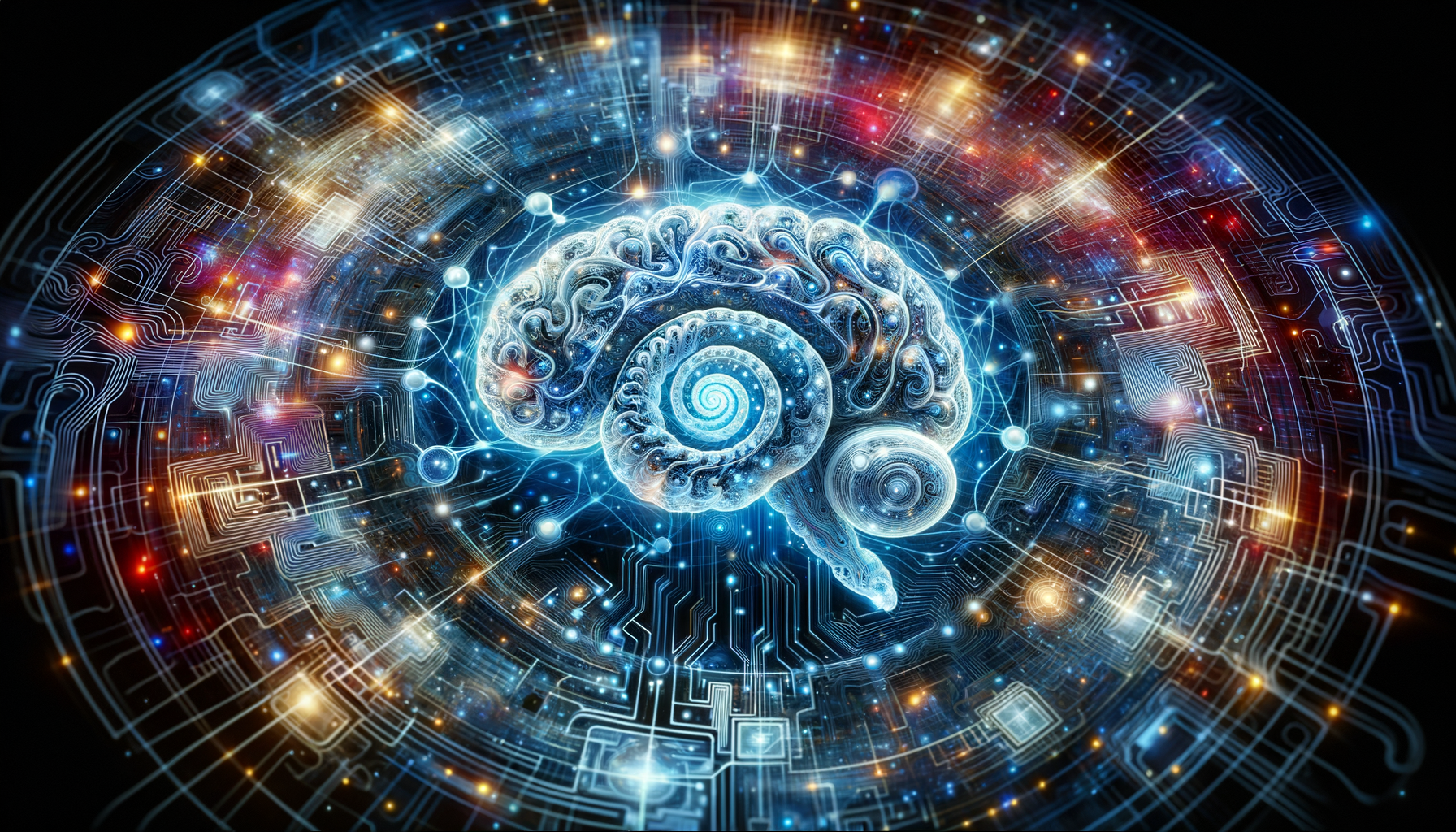
Leading Chatbot Solutions in Healthcare
At Messenger Bot, we’re proud to be at the forefront of chatbot technology in healthcare. Our AI-powered solutions are designed to revolutionize patient interactions and streamline healthcare processes. Let’s explore some of the leading chatbot solutions in the medical field and how they’re transforming patient care.
What is the most used chatbot in medical settings?
While there isn’t a single “most used” chatbot across all medical settings, several solutions have gained significant traction in the healthcare industry. Our Messenger Bot platform is among the top contenders, offering tailored chatbot solutions for various healthcare needs.
Some of the widely adopted chatbots in healthcare include:
- Messenger Bot: Our AI-powered chatbot specializes in patient engagement, appointment scheduling, and providing basic medical information.
- Sensely: Known for its avatar-based interface, Sensely assists with patient triage and chronic disease management.
- Ada Health: This AI-powered health assessment tool helps patients understand their symptoms and provides guidance on next steps.
- Buoy Health: Focuses on symptom checking and helping patients decide whether they need to seek medical attention.
- Babylon Health: Offers AI-powered health assessments and virtual consultations with healthcare professionals.
Each of these chatbots brings unique features to the table, but they all share the common goal of improving patient care and streamlining healthcare processes. At Messenger Bot, we continuously refine our chatbot technology to meet the evolving needs of healthcare providers and patients alike.
Our chatbot stands out due to its ability to integrate seamlessly with existing healthcare systems, its advanced natural language processing capabilities, and its customizable features that cater to specific medical specialties. We’ve seen a significant increase in adoption rates among hospitals, clinics, and private practices, demonstrating the growing trust in our AI-powered customer service bots.
AI chatbot for healthcare: Transforming patient interactions
AI chatbots are revolutionizing patient interactions in healthcare settings. At Messenger Bot, we’re witnessing firsthand how our chatbot technology is enhancing patient experiences and improving operational efficiency for healthcare providers.
Here are some ways AI chatbots are transforming patient interactions:
- 24/7 Availability: Our chatbots provide round-the-clock support, answering patient queries and offering guidance at any time of day or night.
- Efficient Triage: By asking relevant questions and analyzing symptoms, chatbots can help prioritize patients based on the urgency of their conditions.
- Appointment Scheduling: Patients can easily book, reschedule, or cancel appointments through chatbot interfaces, reducing administrative workload.
- Medication Reminders: Chatbots can send timely reminders for medication intake and follow-up appointments, improving patient adherence.
- Health Education: Our AI chat bots provide reliable health information, helping patients understand their conditions and treatment options.
The impact of AI chatbots in healthcare extends beyond patient interactions. They’re also helping healthcare providers by:
- Reducing administrative burdens, allowing medical staff to focus more on patient care
- Collecting and analyzing patient data to identify trends and potential health risks
- Improving patient engagement and satisfaction through personalized interactions
- Facilitating seamless communication between patients and healthcare providers
As we continue to develop our chatbot technology at Messenger Bot, we’re excited about the potential for even more advanced applications in healthcare. From predictive analytics to personalized treatment recommendations, the future of AI chatbots in healthcare is bright.
We’re committed to staying at the forefront of this technological revolution, constantly refining our chatbot solutions to meet the evolving needs of the healthcare industry. By leveraging the power of AI, we’re not just transforming patient interactions – we’re helping to shape the future of healthcare delivery.
The Impact of ChatGPT on Healthcare Chatbots
At Messenger Bot, we’re constantly monitoring the latest advancements in chatbot technology to ensure we’re providing the best possible solutions for our healthcare clients. The emergence of ChatGPT has undoubtedly made waves in the AI and chatbot industry, including healthcare. Let’s explore how ChatGPT is influencing the landscape of healthcare chatbots and how it compares to traditional solutions.
Is ChatGPT a chatbot?
Yes, ChatGPT is indeed a chatbot, but it’s important to understand that it’s a highly advanced, general-purpose AI language model. Unlike our specialized healthcare chatbots, ChatGPT is designed to engage in a wide range of conversations and tasks across various domains.
Key characteristics of ChatGPT as a chatbot include:
- Natural Language Processing: It can understand and generate human-like text responses.
- Contextual Understanding: ChatGPT can maintain context throughout a conversation.
- Versatility: It can handle a wide range of topics and tasks, from answering questions to creative writing.
- Continuous Learning: OpenAI regularly updates ChatGPT to improve its capabilities.
While ChatGPT’s capabilities are impressive, it’s important to note that it’s not specifically tailored for healthcare use. This is where our AI-powered customer service bots at Messenger Bot come in, offering specialized solutions designed explicitly for healthcare applications.
ChatGPT vs. traditional healthcare chatbots
The introduction of ChatGPT has certainly raised the bar for AI capabilities, but when it comes to healthcare, specialized chatbots like ours at Messenger Bot still hold significant advantages. Let’s compare ChatGPT with traditional healthcare chatbots:
- Specialization: Our healthcare chatbots are specifically designed and trained on medical data, ensuring accurate and relevant responses to health-related queries. ChatGPT, while knowledgeable, lacks this specialized focus.
- Regulatory Compliance: Healthcare chatbots, including ours, are built with HIPAA compliance and other healthcare regulations in mind. ChatGPT doesn’t inherently have these safeguards.
- Integration: Our AI chatbots can seamlessly integrate with existing healthcare systems and Electronic Health Records (EHRs), which ChatGPT cannot do out of the box.
- Customization: We tailor our chatbots to each healthcare provider’s specific needs, terminology, and protocols. ChatGPT offers a one-size-fits-all approach.
- Contextual Healthcare Understanding: Our bots understand the nuances of medical conversations and can provide more accurate triage and health advice.
However, ChatGPT does bring some advantages to the table:
- Advanced Natural Language Understanding: ChatGPT’s language processing capabilities are highly sophisticated, allowing for more natural conversations.
- Broad Knowledge Base: It can provide information on a wide range of health topics, albeit with the caveat that this information may not always be up-to-date or medically verified.
- Rapid Development: The technology behind ChatGPT is evolving quickly, which could lead to more advanced healthcare applications in the future.
At Messenger Bot, we’re excited about the advancements ChatGPT represents for AI technology. We’re continuously incorporating cutting-edge AI developments into our own chatbot solutions, ensuring that we offer the best of both worlds: the advanced language processing capabilities inspired by models like ChatGPT, combined with the specialized knowledge and features required for healthcare applications.
As we move forward, we anticipate a hybrid approach where the strengths of general AI models like ChatGPT are combined with the specialized capabilities of healthcare-specific chatbots. This evolution will lead to even more sophisticated, accurate, and helpful chatbot solutions for the healthcare industry.
Our commitment at Messenger Bot remains unwavering: to provide state-of-the-art, healthcare-specific chatbot solutions that leverage the latest in AI technology while maintaining the highest standards of accuracy, compliance, and patient care. As the chatbot landscape continues to evolve, we’re excited to be at the forefront, driving innovation in healthcare communication and patient support.
The Future of Chatbot Technology in Healthcare
At Messenger Bot, we’re constantly looking ahead to anticipate the evolving landscape of chatbot technology in healthcare. As we continue to develop our AI-powered customer service bots, we’re excited about the emerging trends and potential advancements that will shape the future of healthcare communication.
Chatbot technologies: Emerging trends in medical applications
The future of chatbot technology in healthcare is promising, with several emerging trends set to transform patient care and hospital efficiency:
- Advanced Natural Language Processing (NLP): Future chatbots will have enhanced ability to understand context, nuance, and even emotional cues in patient communication, leading to more human-like interactions.
- Integration with Internet of Medical Things (IoMT): Chatbots will increasingly interface with wearable devices and smart medical equipment, providing real-time health monitoring and personalized care recommendations.
- Predictive Analytics: By analyzing patterns in patient data, chatbots will be able to predict potential health issues before they become serious, enabling proactive care.
- Voice-Activated Assistants: Voice-enabled chatbots will become more prevalent, offering hands-free interaction for both patients and healthcare providers.
- Multilingual Support: Our multilingual chatbots will continue to evolve, breaking down language barriers in healthcare communication globally.
These advancements will significantly enhance the capabilities of chatbot technologies in healthcare, making them indispensable tools for both patients and healthcare providers.
Clinical chatbots: Enhancing patient care and hospital efficiency
Clinical chatbots are set to play a crucial role in improving patient care and streamlining hospital operations. Here’s how we envision these AI-powered assistants enhancing healthcare delivery:
- Personalized Treatment Plans: By analyzing patient data and medical history, clinical chatbots will assist healthcare providers in developing tailored treatment plans.
- Medication Management: Chatbots will help patients adhere to their medication schedules, providing reminders and information about potential side effects.
- Appointment Scheduling and Follow-ups: Our Facebook Messenger chatbots will streamline appointment booking processes and automate follow-up communications.
- Triage and Emergency Response: Advanced chatbots will assess symptoms and provide immediate guidance, potentially saving lives in emergency situations.
- Mental Health Support: AI-powered chatbots will offer 24/7 mental health support, providing a first line of assistance for those in need.
As these clinical chatbots become more sophisticated, they will significantly enhance hospital efficiency by automating routine tasks, reducing administrative burdens, and allowing healthcare professionals to focus more on direct patient care.
At Messenger Bot, we’re committed to staying at the forefront of these advancements. Our team is constantly working on incorporating the latest AI technologies into our chatbot solutions, ensuring that we provide cutting-edge tools for healthcare providers.
While we’re excited about the future, we also recognize the importance of maintaining a balance between technological innovation and the human touch in healthcare. Our goal is to develop chatbot technologies that complement and enhance human care, rather than replace it.
As we look to the future, we’re dedicated to collaborating with healthcare providers, AI experts, and patients to create chatbot solutions that truly revolutionize healthcare delivery. By harnessing the power of AI and chatbot technology, we believe we can contribute to a future where healthcare is more accessible, efficient, and personalized than ever before.
